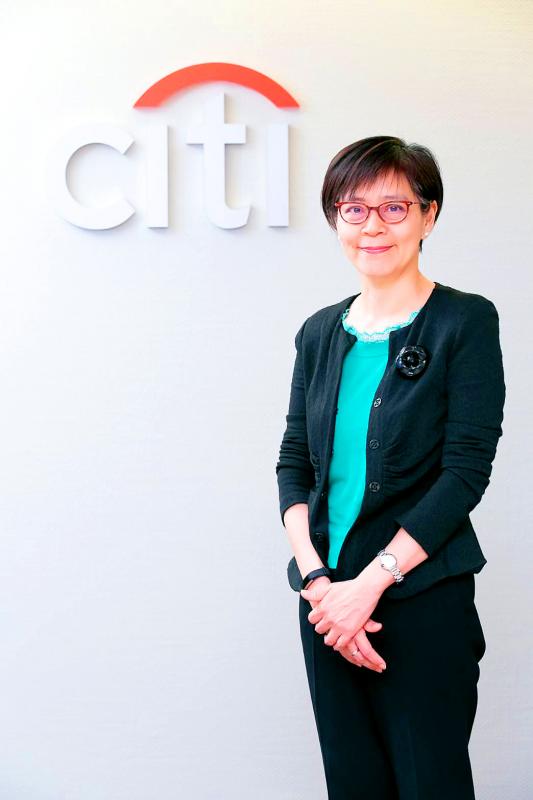Clients of Citibank Taiwan Ltd (台灣花旗) have had one of their busiest years, as the bank’s institutional businesses supported them across capital raising, merger and acquisitions (M&As) and trade, among other areas.
Citi remains optimistic that clients would continue to drive growth across its institutional franchise, given the momentum and aspirations of local companies.
Over the past couple of years, Citi has been an adviser on five Taiwan-related M&As, which included industries such as technology, retail sales, renewable energy and financial services. The transactions were transformational, making the companies global leaders in their industries.

Photo courtesy of Citibank Taiwan Ltd
This year, Citi has used pre-initial public offering placements, block trades, convertible and exchangeable bonds, and US dollar bond issuances to raise billions of dollars across the local and global capital markets for Taiwanese corporations.
“Taiwan is home to many world-class companies and we are committed to supporting their ambitions. There is a massive transformation happening across all industries and with a global network, this has helped sharpen Citi’s dialogue with clients in Taiwan, as they increasingly want a regional and global perspective,” said Christie Chang (張聖心), head of banking, capital markets and advisory at Citibank Taiwan and chair of Asia-Pacific Corporate Banking.
Citibank Taiwan has seen solid growth in its local corporate banking business as it supports the domestic and international banking needs of companies, whose supply chains are evolving further.
The bank’s local and regional networks connect Taiwanese corporations to the rest of Asia, while Citigroup connects them to a global network of 160 markets.
Some of the bank’s inflows that have grown the most this year have been across trade corridors involving Taiwan.
This year, outflows from Taiwan to India have increased nearly 50 percent, while outflows from Taiwan to ASEAN members have risen about 20 percent, as firms continue to diversify their supply chains.
The bank has also seen steady growth in inflows to Taiwan, too, most notably from companies in Australia, India and Japan.

TAKING STOCK: A Taiwanese cookware firm in Vietnam urged customers to assess inventory or place orders early so shipments can reach the US while tariffs are paused Taiwanese businesses in Vietnam are exploring alternatives after the White House imposed a 46 percent import duty on Vietnamese goods, following US President Donald Trump’s announcement of “reciprocal” tariffs on the US’ trading partners. Lo Shih-liang (羅世良), chairman of Brico Industry Co (裕茂工業), a Taiwanese company that manufactures cast iron cookware and stove components in Vietnam, said that more than 40 percent of his business was tied to the US market, describing the constant US policy shifts as an emotional roller coaster. “I work during the day and stay up all night watching the news. I’ve been following US news until 3am

UNCERTAINTY: Innolux activated a stringent supply chain management mechanism, as it did during the COVID-19 pandemic, to ensure optimal inventory levels for customers Flat-panel display makers AUO Corp (友達) and Innolux Corp (群創) yesterday said that about 12 to 20 percent of their display business is at risk of potential US tariffs and that they would relocate production or shipment destinations to mitigate the levies’ effects. US tariffs would have a direct impact of US$200 million on AUO’s revenue, company chairman Paul Peng (彭雙浪) told reporters on the sidelines of the Touch Taiwan trade show in Taipei yesterday. That would make up about 12 percent of the company’s overall revenue. To cope with the tariff uncertainty, AUO plans to allocate its production to manufacturing facilities in

Six years ago, LVMH’s billionaire CEO Bernard Arnault and US President Donald Trump cut the blue ribbon on a factory in rural Texas that would make designer handbags for Louis Vuitton, one of the world’s best-known luxury brands. However, since the high-profile opening, the factory has faced a host of problems limiting production, 11 former Louis Vuitton employees said. The site has consistently ranked among the worst-performing for Louis Vuitton globally, “significantly” underperforming other facilities, said three former Louis Vuitton workers and a senior industry source, who cited internal rankings shared with staff. The plant’s problems — which have not

COLLABORATION: Given Taiwan’s key position in global supply chains, the US firm is discussing strategies with local partners and clients to deal with global uncertainties Advanced Micro Devices Inc (AMD) yesterday said it is meeting with local ecosystem partners, including Taiwan Semiconductor Manufacturing Co (TSMC, 台積電), to discuss strategies, including long-term manufacturing, to navigate uncertainties such as US tariffs, as Taiwan occupies an important position in global supply chains. AMD chief executive officer Lisa Su (蘇姿丰) told reporters that Taiwan is an important part of the chip designer’s ecosystem and she is discussing with partners and customers in Taiwan to forge strong collaborations on different areas during this critical period. AMD has just become the first artificial-intelligence (AI) server chip customer of TSMC to utilize its advanced